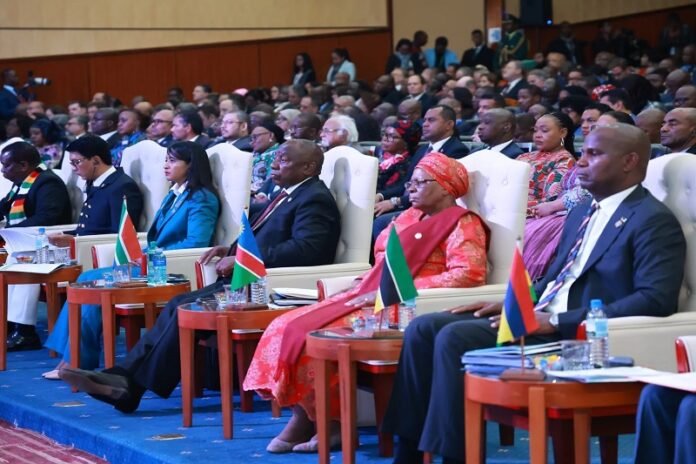A revealing moment in the battle for regional influence
The most recent summit of the Southern African Development Community (SADC) was marked by a highly symbolic event: South Africa’s attempt to insert a new clause supporting the Polisario Front into the final communiqué failed, after several African countries close to Morocco intervened. This was no mere protocol debate—it was a turning point, revealing deep shifts in Africa’s balance of power: the separatist narrative is increasingly isolated, while Morocco’s vision is steadily gaining ground across regional blocs.
What may appear minor carries weighty implications—not only for the future of the Moroccan Sahara issue, but also for Morocco’s role in Africa, and for the limits of South African influence, long shaped by a Cold War-era discourse.
SADC between historic loyalty and new realities
For decades, SADC, which brings together 16 countries of Southern Africa, has been used by Pretoria to advance pro-Polisario positions. This alignment is rooted in ideological and historical affinities dating back to the liberation struggles of the 1970s and 1980s. Morocco, though supportive of Southern African countries in their fight against colonialism, never received reciprocal backing on its territorial integrity.
South Africa, seeing itself as heir to this revolutionary legacy, spent decades trying to turn SADC into a Polisario stronghold. But political and economic change is eroding that influence. Today, many Southern African states view Morocco as a vital partner in trade, agriculture, food security, energy transition, and even in the spiritual and religious sphere.
How Pretoria’s maneuver was foiled
Behind the scenes at the summit, South Africa pushed for a clause calling explicitly for SADC to “renew support for the Polisario.” But the proposal faced clear opposition from several member states, notably Tanzania, Zambia, and the Democratic Republic of Congo. They argued that divisive disputes should not hijack an agenda focused on development and regional security.
Their intervention blocked the attempt, a sign that the Polisario no longer enjoys the unquestioned legitimacy it once had in the organization. Economic and developmental priorities are leading many African capitals to reassess old loyalties—especially as Morocco provides tangible alternatives through investments and cross-border projects.
Three key lessons
-
The erosion of historical narratives: the rhetoric of “revolutionary solidarity” no longer resonates with a new generation of African leaders, more focused on poverty, unemployment, and climate change than on outdated ideological disputes.
-
Morocco’s rise as a continental actor: through initiatives in agriculture, energy, and food security, Morocco is expanding its reach into Southern Africa, presenting itself as a bridge to major European and Arab partnerships.
-
Pretoria’s declining agenda-setting power: domestic crises—electricity shortages, high unemployment, economic stagnation—have curtailed South Africa’s capacity to project leadership, allowing other voices to assert more independent positions.
Morocco: from defense to initiative
Where African summits once served to disseminate hostile statements against Morocco, the picture has shifted. Morocco is no longer on the defensive; it is actively shaping the agenda.
-
Economic diplomacy: large-scale agricultural projects in Zambia and Ethiopia; fertilizer investments benefiting tens of millions of African farmers.
-
Renewable energy: expertise in solar and wind power shared with several African countries, helping shape the continent’s development future.
-
Religious security: training of imams and spiritual leaders from across Africa in Morocco, creating strong cultural and spiritual bonds.
South Africa’s leadership crisis
Pretoria’s failed attempt was not just persistence on a “principle,” but a symptom of deeper problems. Once the “voice of Africa” on the global stage, South Africa is now weighed down by internal crises: rolling blackouts, high unemployment, declining competitiveness. Its attempts to export these problems by playing the Sahara card look more like escapism than strategy—something other African capitals are quick to perceive.
The international dimension
The SADC episode cannot be separated from the global context. Major powers—from the United States to the European Union, China to India—are increasingly endorsing Morocco’s autonomy initiative as the realistic and practical solution. African countries that blocked Pretoria’s maneuver are well aware of this shift, and have no wish to be seen as isolated spoilers. Some even hope their alignment with Morocco will strengthen their access to continent-spanning trade frameworks, such as the African Continental Free Trade Area (AfCFTA).
Conclusion: the end of a monopoly
The summit showed that the era of South Africa easily imposing anti-Moroccan positions within Africa is over. The Polisario can no longer hide behind the slogan of “African solidarity” as a shield for separatism.
Through smart diplomacy and a growing African network of allies, Morocco has neutralized platforms once seen as impregnable bastions of separatist ideology. Each summit now reinforces the reality: Morocco’s territorial unity project is gaining resonance, while Polisario support steadily erodes.
A battle for the future
The SADC incident is just one episode in a long struggle. But its meaning is unmistakable: Morocco is no longer alone. It is backed by allies who share its vision for Africa’s future. Meanwhile, South Africa’s posture as undisputed regional leader is receding.
This is a turning point: Africa’s power balances are shifting, and Morocco—grounded in pragmatic, development-focused cooperation—has positioned itself as a key continental player, while the separatists sink deeper into isolation.




